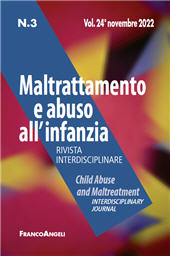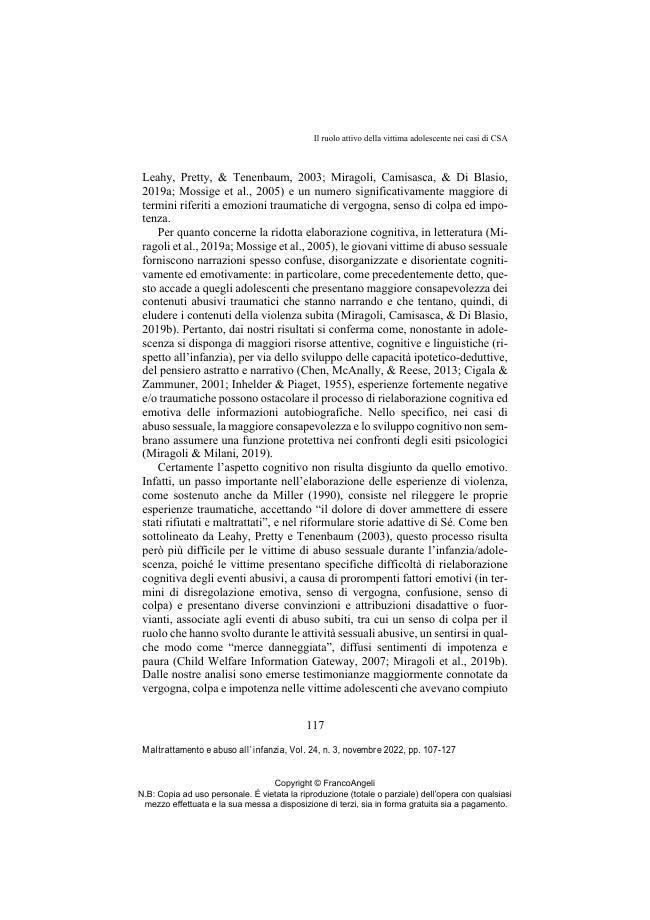Il ruolo attivo della vittima in caso di abuso sessuale : conseguenze in adolescenza
107-127 p.
Il presente studio si propone di indagare se in adolescenza il partecipare attivamente alle azioni di abuso sessuale (\u0022agire atti sessuali\u0022 come l'induzione o la coercizione della vittima a impegnarsi in pratiche quali la stimolazione dei genitali dell'abusante, rapporti orali/anali e esibizioni erotiche al fine di soddisfare i desideri sessuali del perpetratore) comporti un maggior aggravarsi, in termini di rielaborazione cognitiva dell'esperienza abusiva e di sviluppo di emozioni traumatiche di vergogna, colpa ed impotenza, rispetto al subire passivamente la violenza sessuale. Sono state analizzate 32 deposizioni di adolescenti vittime di abuso sessuale, con un'età media al momento dell'audizione di 14 anni (DS = 1.72; range = 1117 anni). Per risalire alle cognizioni e alle emozioni traumatiche connesse all'abuso sessuale subito, le deposizioni delle vittime sono state testualmente analizzate attraverso il Linguistic Inquiry e Word Count (LIWC; Pennebaker et al., 2001).
I risultati confermano che in adolescenza la partecipazione attiva alle dinamiche di abuso sessuale risulta maggiormente connessa a difficoltà di rielaborazione cognitiva dei fatti traumatici occorsi, con un importante e significativo apporto da parte di emozioni traumatiche particolarmente lesive, come vergogna, senso di colpa e impotenza. [Testo dell'editore].
This study aims to investigate whether in adolescence actively participating in sexual abuse actions (\u0022engaging in sexual acts\u0022 such as the induction or coercion of the victim to engage in practices like stimulation of the abuser's genitals, oral/anal intercourse and erotic performances in order to satisfy the sexual desires of the perpetrator) leads to a greater aggravation, in terms of cognitive processing of the abusive experience and the development of traumatic emotions of shame, guilt and learned helplessness, compared to passively undergoing sexual violence. Thirtytwo depositions of adolescent victims of sexual abuse, with an average age at the time of hearing of 14 years (SD = 1.72; range = 1117 years), were analyzed.
To examine the traumatic cognitions and emotions associated with the sexual abuse, the depositions were verbatim analyzed through the Linguistic Inquiry and Word Count (LIWC; Pennebaker et al., 2001). The results confirm that in adolescence, active participation in the dynamics of sexual abuse is more connected to difficulties in cognitive processing of the traumatic events that occurred, with an important and significant contribution from particularly harmful traumatic emotions, such as shame, guilt and learned helplessness. [Publisher's text].
Forma parte de
Maltrattamento e abuso all'infanzia : 24, 3, 2022-
Artículos del mismo número (disponibles individualmente)
-
Información
Código DOI: 10.3280/MAL2022-003006
ISSN: 1972-5140
MATERIAS
KEYWORDS
- abuso sessuale infantile, adolescenza, trauma, emozioni, cognizioni
- child sexual abuse, adolescence, trauma, emotion, cognitions



